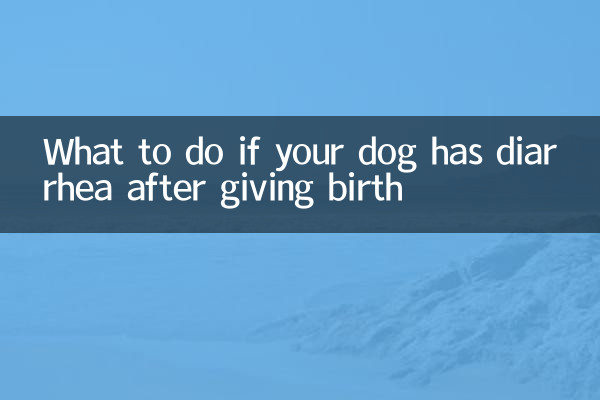What to do if your dog has diarrhea after giving birth
Postpartum dog diarrhea is a common problem encountered by many pet owners, especially female dogs that have just given birth. They are weak and prone to gastrointestinal disorders. This article will combine the hot topics and hot content on the Internet in the past 10 days to provide you with detailed answers to the causes, countermeasures and prevention methods of postpartum dog diarrhea.
1. Common causes of postpartum diarrhea in dogs

Postpartum dog diarrhea may be caused by many factors. The following are the reasons that have been discussed most recently by netizens:
| Reason | Proportion (recent discussion hotness) | Typical symptoms |
|---|---|---|
| Improper diet | 35% | Soft or watery stools, loss of appetite |
| gastrointestinal infection | 25% | Diarrhea accompanied by vomiting and listlessness |
| stress response | 20% | Mild diarrhea, moodiness |
| parasitic infection | 15% | Diarrhea with blood or mucus, weight loss |
| Other reasons (such as drug side effects) | 5% | Diarrhea accompanied by other abnormal reactions |
2. How to deal with postpartum dog diarrhea
For different reasons, the following measures can be taken:
1. Adjust your diet
The diet of postpartum female dogs should be easy to digest and nutritionally balanced. You can feed low-fat chicken porridge, pumpkin puree and other mild foods to avoid high-fat or irritating foods. In recent popular discussions, many pet owners recommend usingProbioticsRegulating the intestines and stomach, the effect is remarkable.
2. Replenish moisture
Diarrhea can cause dehydration in dogs, especially nursing mothers. You can feed warm water or glucose water to help replenish body fluids. If the dog is unwilling to drink water, you can use a syringe to feed it in small amounts and multiple times.
3. Medical examination
If diarrhea lasts for more than 24 hours or is accompanied by vomiting, fever and other symptoms, seek medical attention immediately. Among recent veterinary recommendations,Parasite testingandRoutine blood testsIt is a common diagnostic method.
4. Environmental management
Keep the delivery room clean and dry to avoid bacterial growth. In recent hot topics, many pet owners have shared their use ofdisinfectant sprayandheating padexperience, effectively reducing the dog’s stress response.
3. Methods to prevent postpartum dog diarrhea
Prevention is better than cure. Here are the effective preventive measures recently summarized by netizens:
| Precautions | Implementation method | Effect (feedback from netizens) |
|---|---|---|
| Scientific feeding | Choose special postpartum dog food and eat smaller meals more frequently | 90% think it is effective |
| Regular deworming | Complete deworming before delivery and follow the veterinarian’s advice after delivery. | 85% think it is effective |
| Reduce stress | Keep the environment quiet and avoid frequent interruptions | 80% think it is effective |
| Supplement nutrition | Add calcium tablets, vitamins and other nutrients | 75% think it is effective |
4. Popular questions and answers from netizens
The following are recent popular questions and answers about postpartum dog diarrhea:
Q: Can dogs with diarrhea after giving birth be given antidiarrheal medicine?
A: No! Human drugs may have toxic side effects on dogs, so you must follow the doctor’s advice when using pet-specific drugs.
Q: Can the female dog still breastfeed during diarrhea?
A: If the diarrhea is mild and the bitch is in good condition, you can continue breastfeeding; but if the diarrhea is severe or the bitch is weak, you need to suspend breastfeeding and seek medical attention.
Q: How to choose probiotics?
A: Choose pet-specific probiotics. Recently popular brands include "Mommy Love" (pet version) and "Beloved Fragrance".
5. Summary
Although postpartum dog diarrhea is common, it should not be ignored. Through scientific feeding, timely hydration and necessary medical treatment, most cases can be relieved quickly. If your dog has symptoms of diarrhea, it is recommended to observe its mental state and appetite first, and consult a professional veterinarian if necessary.
Recent network data shows thatDiet managementandProbiotic useIt is a popular solution for postpartum dog diarrhea. I hope this article can help you take better care of your postpartum female dog!

check the details

check the details